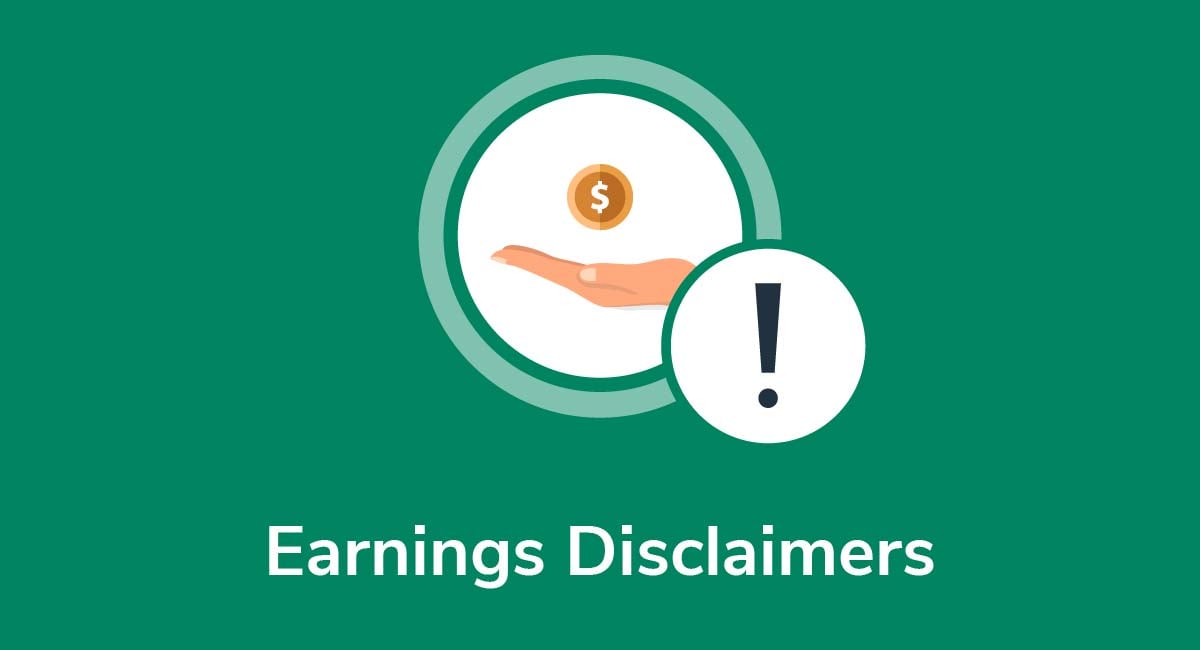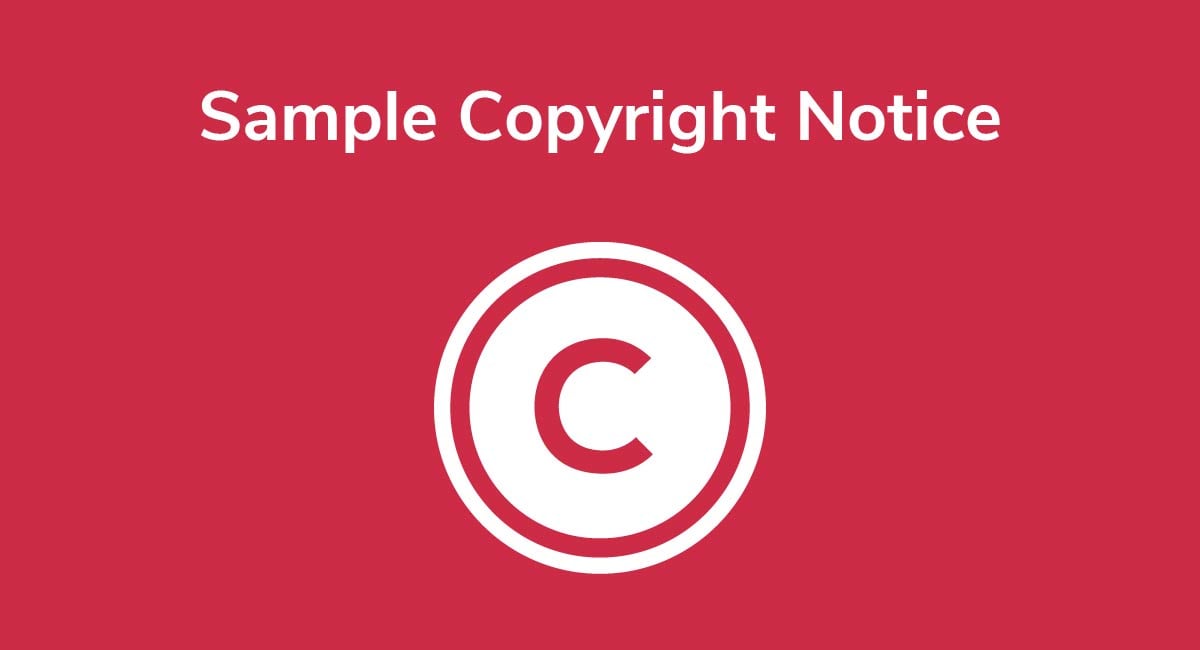Disclaimers for Advertising
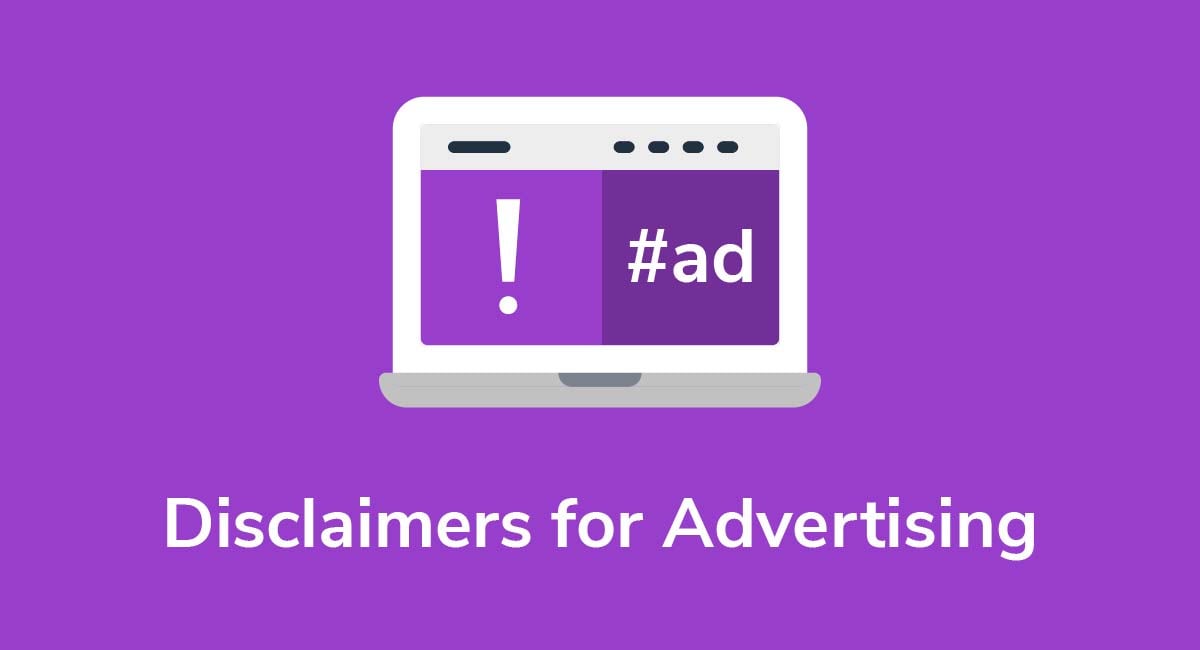
Advertising disclaimers are short statements displayed on advertisements that declare that the content is an ad. These disclaimers help protect a business from various types of legal claims, while also ensuring your audience has the information they need to make informed decisions.
This article will explain what advertising disclaimers are and how to write and display your own.
Get compliant today with PrivacyPolicies.com
Select one of our generators to create the required legal agreements for your business:
- Our Privacy Policy Generator can help you generate a customized Privacy Policy in around three minutes, for free.
- Our Terms & Conditions Generator can help you generate a customized Terms & Conditions agreement in around three minutes, for free.
- Our EULA Generator can create a customized End-User License Agreement for your mobile or desktop app.
- Our Cookies Policy Generator can create a customized Cookies Policy to help your compliance with ePrivacy Directive and GDPR.
- Our Disclaimer Generator can create a disclaimer or disclosure for your website.
- Our Return & Refund Policy Generator can help your ecommerce store by creating a returns or refunds policy.
Integrate a free Cookies Notice and Cookie Consent banner to comply with the EU ePrivacy Directive and the new GDPR law regarding cookies.
- 1. What is a Disclaimer?
- 1.1. Advertising Disclaimers
- 2. Why Do Ads Need Disclaimers?
- 2.1. Advertising Disclaimers and Deceptive Ads
- 2.1.1. How Do I Know if My Ads Are Deceptive?
- 3. Are Advertising Disclaimers Legally Required?
- 4. Types of Advertising Disclaimers
- 5. How Write Your Advertising Disclaimers
- 5.1. Affiliate Disclaimers
- 5.2. Sponsored Content Disclaimers
- 5.3. Advice Disclaimers
- 5.3.1. Medical Disclaimers
- 5.3.2. Legal or Financial Advice Disclaimers
- 5.3.3. Services Disclaimers
- 5.4. Email Advertising Disclaimers
- 6. Displaying an Advertising Disclaimer
- 7. Summary
What is a Disclaimer?
A disclaimer is a short notice advising people what you can't be held liable for. It's a statement designed to limit your legal obligations to your audience so they understand what risks they're assuming by taking certain actions, such as buying a product you advertise or following your health tips.
By clearly stating what you can't be held responsible for, you can reduce the chances of someone suing your business.
Advertising Disclaimers
Advertising disclaimers are a specific type of disclaimer you should include if you're promoting goods or services online. Here are some examples of who should use these types of disclaimers:
- Influencers who are paid to advertise a product or service use disclaimers to confirm it's a paid ad and not necessarily an impartial or unbiased personal opinion.
- Alcohol retailers can use disclaimers to remind viewers to drink responsibly.
- Individuals advertising a company's products or services can use disclaimers to declare any affiliations.
Why Do Ads Need Disclaimers?

Ads need disclaimers for a few key reasons:
- An ad disclaimer can protect your business from potentially costly lawsuits if your advertisements convince consumers to buy goods or services and they're harmed as a result.
- Ad disclaimers help to build consumer trust in your business because they increase transparency and make your company appear more professional.
- An ad disclaimer gives you more control over what you can be held responsible for, and what's beyond your scope of responsibility.
Disclaimers will not shield you from liability, though, if your advert is deemed deceptive or unfair.
Advertising Disclaimers and Deceptive Ads
According to the Federal Trade Commission (FTC), deceptive ads are likely to mislead customers into buying goods or services. This could be because, for example, the ad makes exaggerated claims based on little evidence, or it gives the customer the wrong impression of what they're buying.
Ads could be deemed unfair if they're likely to cause the consumer harm or they're based on fraudulent claims. For example, an ad promoting a cancer cure to terminally ill patients may be deemed unfair.
How Do I Know if My Ads Are Deceptive?
According to the FTC's interpretation of Section 5 of the Federal Trade Commission Act, your ads may be classed as unfair or deceptive if there's a chance they will leave a reasonable consumer with the wrong impression.
- The FTC considers the ad as a whole, from a consumer's perspective, to determine whether it's likely to mislead individuals.
- Ads are more likely to be deemed unfair or deceptive if they make false claims which directly impact whether the customer buys the product.
- Any ads which make health or safety claims are especially vulnerable to scrutiny, particularly if they don't have evidence to substantiate claims made.
Are Advertising Disclaimers Legally Required?

Sometimes, yes. Disclaimers are mandatory if your ads fall within any of the following categories:
- You are receiving monetary compensation in exchange for advertising goods or services.
- The company provides you with any benefits in exchange for promoting the products e.g. you receive free items, store credit, or special discounts.
- You are endorsing a brand you're affiliated with.
Types of Advertising Disclaimers
If you're creating advertising disclaimers, they typically fall into one of three categories:
- Affiliate disclaimers: These disclaimers can be used by individuals who participate in affiliate marketing and get paid if individuals click on certain promoted links.
- Sponsored content disclaimers: Disclaimers designed to inform viewers that the individual making the ad is sponsored by the company they're advertising.
- Advice disclaimers: These are disclaimers you add to content which could be construed as offering advice, such as health or investment advice.
How Write Your Advertising Disclaimers

Your advertising disclaimer should be tailored to your audience and your specific business needs. However, here is an overview of how you can approach writing a disclaimer based on which type of notice your ad requires.
Affiliate Disclaimers
If you're affiliated with a company, you must disclose this when you are promoting the brand online or including affiliate links in your content.
Here's an example from BuzzFeed. BuzzFeed earns a commission when visitors click certain links or make purchases from third parties. According to the disclaimer, BuzzFeed can't be held liable for third party offerings:
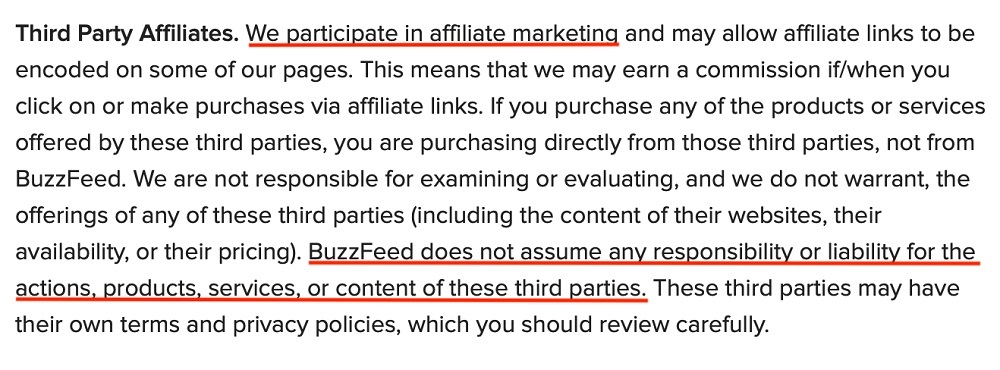
Individuals purchasing products advertised by Doc Lyss Fitness will know that she receives a commission when they click certain links or use promoted codes, thanks to this disclaimer:

There's no need for a lengthy disclaimer. Just ensure it's clear that you're an affiliate and you might receive a commission in certain circumstances.
Sponsored Content Disclaimers
Even if you're not affiliated with a brand, but they're sponsoring your content in some way, then you must include a disclaimer with the relevant ads. For example, you might use a sponsored content disclaimer if you're paid to post an ad, or if you're sent free products in exchange for a review.
These types of disclaimers are common in social media posts and YouTube videos where you might be advertising a product but you need to make it clear that your opinion could be influenced by the fact it's a sponsored ad. They should be highly visible (or, in the case of video ads, articulated clearly).
For example, YouTuber ReadWithCindy includes obvious captions when she's about to promote a product in a video:

And if you're promoting a brand on a platform like Instagram, you can use hashtags like "#ad" and place it somewhere obvious.
Here's an example from Alexkbfit, a TikTok influencer promoting a HelloFresh meal kit. It's obvious from the tags and the post content that this is a sponsored promotion ad, so viewers won't be deceived into thinking this is a non-sponsored, impartial opinion:

Ad disclaimers are unusual in that they're not always lengthy. They can just be a word or two. It all depends on the medium you're using.
Advice Disclaimers
Advice disclaimers help to protect your business from lawsuits filed by customers who are harmed in some way after acting on the advice you give. They can also be used if there's a chance that a customer will buy goods or services you're advertising e.g. health supplements because your ad leads them to believe the products will solve their problems.
There are, roughly, three types of liability disclaimers that are relevant to ad campaigns, so let's break them down.
Medical Disclaimers
Medical disclaimers should clarify that the content is for information purposes only and it does not substitute medical advice. Remind people to contact an allied health professional e.g. doctor, physiotherapist, or dentist for a diagnosis and treatment plan.
The Joseph Spine Institute, for example, has a general disclaimer reminding people not to rely upon its content for diagnosing a medical condition. Such a disclaimer could also be added to advertisements:

Here's another example from physiotherapists Bob and Brad. They advertise products to help with ailments, such as bicep pain, but include an obvious disclaimer reminding people to seek medical advice rather than rely on the information provided:

Legal or Financial Advice Disclaimers
If you advertise legal or financial services, your content should adhere to certain rules.
- You can't imply you're an expert in a niche you have no specialist knowledge of.
- Stick to facts e.g. if you've won an award, you can advertise this, but you can't declare you're the "best" at something as this is an opinion rather than fact.
- Make it clear that information should not be considered advice. There's no professional relationship created unless a person retains your services.
Harrah Law, for example, reminds readers to choose an attorney carefully and not rely on advertisements:

And although Kennyhertz Perry encourages people to contact the firm for legal advice, it makes clear that there's no attorney-client relationship until the individual becomes a client:

Services Disclaimers
If you're promoting services, your disclaimers should declare the following:
- No information provided is a substitute for professional advice
- Your company can't be held liable for loss or injury sustained if the service isn't used properly or is not suitable for the person's needs
Pros DIY, for example, makes it clear that viewers should hire a professional and that the company is not liable for any damage caused by following its advice or buying promoted products. Similar disclaimers can be added to any service ad:

Email Advertising Disclaimers
If you send promotional emails or newsletters to your audience, then you might benefit from adding disclaimers to the content you send out. Simply include the relevant disclaimer somewhere within the content, such as the email footer.
Here are some other quick tips:
- If relevant, make it clear that there's no attorney-client or doctor-patient relationship created by sending a marketing email or endorsing a certain product. Use language such as "promotion," "ad," or "special offer" to highlight that it's a marketing campaign.
- Give recipients an "unsubscribe" option so they can opt out of marketing emails.
- If you used cookies or analytics data to target your marketing campaigns, link to your Cookie Policy and Privacy Policy so users know how to change their preferences.
- Include a link to your Terms and Conditions agreement so recipients can read your policies in more detail.
Displaying an Advertising Disclaimer

Since disclaimers help to prevent your customers from feeling misled or deceived, your disclaimer must be easy to find. Meaning, you must display your advertising disclaimers somewhere prominent and obvious.
To decide where might be "prominent," think about where your audience expects to find legal notices. They'll typically look for legal notices in three places:
- Within your Terms and Conditions agreement
- Within or close to the advertisement itself
- Within the content e.g. within the blog post, article, or video
We've already covered what disclaimers might look like in promotional or video posts, but here are some other examples.
If you want to include a disclaimer within, for example, a blog post, use bold or italicized writing so it stands out from the content.
Elna Cain does this well. The notice is unobtrusive but obvious enough to serve as a transparent disclaimer to readers:
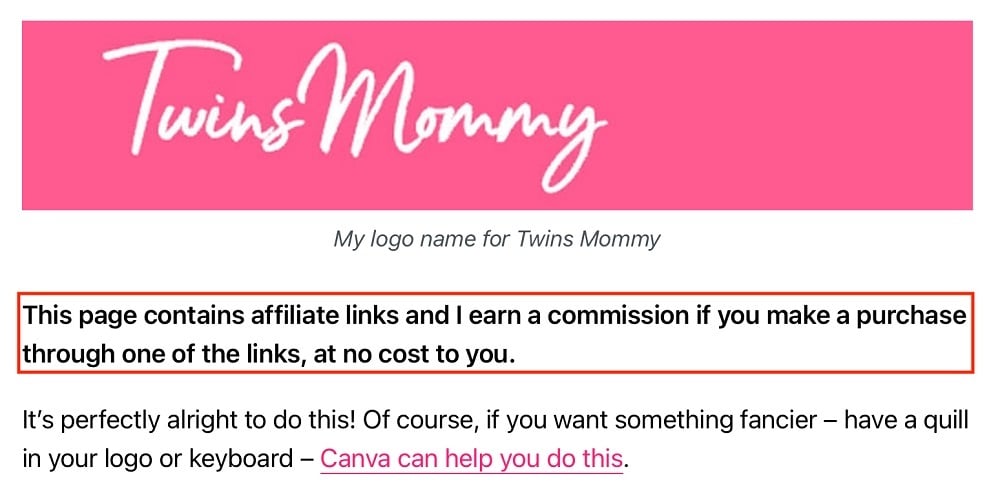
And if we go to her Terms and Conditions, there are a few disclaimers which are relevant for advertising. For example, she does not warrant that the links included on her website are functional, and she's not responsible for what happens if someone clicks a third-party link:

She also makes it clear that she's an affiliate so, although she only endorses products she believes are valuable, readers know she may not be entirely impartial:

However you display your ad disclaimers, just make sure they're clear and give your audience the notice they need to make informed choices after viewing or reading your content.
Summary
Disclaimers reveal any potential conflicts of interest you have, and they help to limit your legal liability by setting out what you can't be held responsible for. Although they're not always legally required, you must include a disclaimer with your ads if you're promoting items for a brand you're affiliated with or paid to promote.
- Use disclaimers to avoid misleading your customers, although bear in mind disclaimers can't protect you from running "deceptive" ads.
- You should use disclaimers if your ads provide anything which could be considered an impartial opinion or medical, legal, or financial advice.
- Every ad disclaimer should be clear and conspicuous.
- Display your ad disclaimers where people normally expect to find such notices, such as within your legal agreements.
